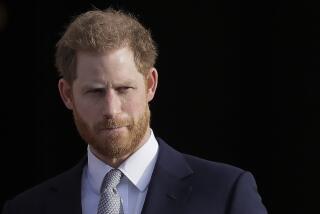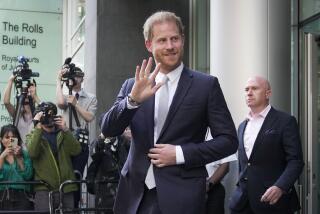British tabloids’ tactics may spur soul-searching
- Share via
Reporting from London — What others might call lying, Paul McMullan calls a brilliant maneuver.
Looking for the goods on a philandering actor, the tabloid reporter hired a private investigator to make a phone call to the actor’s hotel posing as his accountant and persuade the front desk to fax over his room bill, which included a list of all the calls he’d made.
McMullan, who at the time was working for the late, lamentable News of the World, then dialed every number on the list until he got the actor’s mistress on the line — and his scoop.
“If you’re in pursuit of a story, you don’t just go up to someone and say, ‘Hello, I work for News of the World, and are you [having sex with] your secretary or are you fiddling your expenses?’ ” McMullan said, defending tactics that would be forbidden at mainstream American newspapers. “You’ve got to be smarter than that.”
Impersonating other people, rummaging through trashcans, planting hidden cameras, bribing police officers, hacking into cellphones — think of it, and it’s been done by Britain’s aggressive tabloid press in its tireless search for sensational stories. Dodgy ploys like these are what feed a beast that commands the attention of 7 million readers a day, or nearly one out of every eight Britons.
Now, such tactics are coming under major scrutiny amid a growing phone-hacking scandal that has sparked a public uproar and triggered a wide-ranging official inquiry into how Britain’s freewheeling news media operate.
The tabloids like to argue that they’re acting in the “public interest,” but usually that’s just shorthand for “what the public is interested in” — namely, stories about sex, drugs and other titillating topics.
But critics argue that society itself needs to do a little self-examination in the wake of the scandal.
“People who have been buying the News of the World or the Sun are now asking themselves questions: This tittle-tattle I’ve been reading about, these footballers sleeping around, where do these stories come from? Am I so interested that I don’t care about the methods used to get these stories?” said Steven Barnett, a journalism professor at the University of Westminster.
The hacking scandal produced disturbing evidence that the News of the World, which was part of media titan Rupert Murdoch’s giant News Corp., accessed the voicemails not only of celebrities and politicians but also of crime and terrorism victims in its quest for journalistic one-upmanship.
As a result of the allegations, a senior judge has been assigned the task of finding out how such unethical and sometimes illegal practices were allowed to proliferate. The judge will also examine the news media’s cozy relationship with politicians and police, both of whom have been accused of going easy on the press in return for flattering coverage.
The inquiry will probably hear accounts of a cutthroat industry in which the pressure to produce scoops and scandal is so great that ethics get flung aside. It’s a world where reporters write big checks for salacious information, set up sting operations to trap high-profile figures who are having affairs, masquerade as hospital staff members to take photographs of actors after surgery, and employ shady private investigators to dig up confidential financial data.
“The pressure is immense to get results,” said Richard Peppiatt, who worked until a few months ago at the Daily Star, which though one of Britain’s smaller tabloids, boasts a daily circulation of nearly 700,000. “You’re supposed to come up with an agenda-setting story on a daily basis.”
Britain’s scandal sheets have a long and in many cases honorable tradition of muckraking, exposing hypocrisy and holding the great and the good to account. This year, in a happier moment, the News of the World won “Scoop of the Year” at the British Press Awards for a story on match-fixing in cricket.
But Fleet Street’s reputation for sleaziness and ethical confusion has an equally long pedigree.
“You cannot hope to bribe or twist (thank God) the British journalist. But seeing what the man will do unbribed, there’s no occasion to,” goes Humbert Wolfe’s famous ditty from the early 20th century.
Even though other publications use them, the News of the World was particularly skilled in the “dark arts,” the often-shady and deceptive ways of gathering information, industry watchers and former employees said.
Until it was shut down last week, the tabloid was Britain’s bestselling weekly newspaper. It lies at the epicenter of the hacking scandal and is suspected of ordering the illegal accessing of people’s cellphones on an almost industrial scale.
McMullan, who worked for the News of the World from 1994 to 2001 and is now a freelance writer, said the paper also routinely practiced “blagging,” or unearthing people’s personal data, such as financial and medical details, usually by misrepresentation. A blagger might, for example, call up a bank and pose as an employee from a credit agency or even as the target himself to glean information.
McMullan sees nothing wrong with the tactic.
“Is that illegal? Should we be jailed for doing it?” he said. “No, it was a really smart move.”
Fake identities and undercover assignments are stock in trade at the tabloids.
When Piers Morgan, now host of a CNN talk show, was editor of the Daily Mirror, he sent a reporter to work as a footman in the royal household and published photos from inside Buckingham Palace and Windsor Castle. At the News of the World, one reporter became notorious as the “fake sheik,” sent in flowing robes and with wads of cash to hobnob with aristocrats and athletes while recording their embarrassing private observations.
Then there are the hidden cameras. Two years ago, readers of the News of the World thrilled to a video showing British reality-TV star Kerry Katona apparently snorting a line of cocaine. Glossed over was the fact that the video was shot by a secret camera planted in Katona’s bathroom, in her own home.
The reporters who score big scoops are feted as heroes by their editors and colleagues. Those who get beaten by the competition face derision or worse, Peppiatt said.
“I’ve had news editors screaming in my face for five minutes, just spitting in your face, for something minor,” he said. “That’s just common at the newsrooms.”
Last week, former Prime Minister Gordon Brown launched an angry attack on Murdoch’s newspapers in Britain, accusing them of hiring criminals to ferret out information on him and his family.
Murdoch’s papers had slid “from the gutter into the sewer,” Brown declared in a barnstorming appearance in Parliament, one of his first since stepping down as premier a year ago. “The tragedy is they let the rats out of the sewers.”
More to Read
Sign up for Essential California
The most important California stories and recommendations in your inbox every morning.
You may occasionally receive promotional content from the Los Angeles Times.











